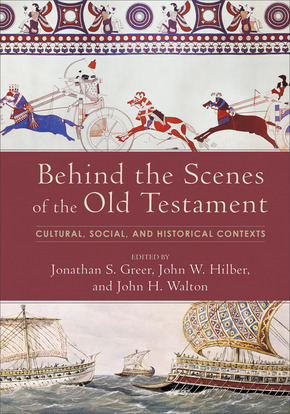(Post by A.D. Riddle)
Available beginning today is an impressive-looking title published by Baker Academic, Behind the Scenes of the Old Testament: Cultural, Social, and Historical Contexts, edited by Jonathan S. Greer, John W. Hilber, and John H. Walton.
The book contains 65 essays (in 640 pages) by many well-known scholars in archaeology, and biblical and Ancient Near East studies, but it also includes several younger scholars who are just beginning their careers in these various disciplines. Perusing the range of topics, it seems that little has been overlooked—iconography, geography, literature, archaeology. The opening chapters addressing historical geography and physical geography will have special appeal to readers of this blog. Essays even extend beyond the title’s “Old Testament” to include Alexander the Great, the Hellenistic period, and the Hasmonean kingdom.
This authoritative volume brings together a team of world-class scholars to cover the full range of Old Testament backgrounds studies in a concise, up-to-date, and comprehensive manner. With expertise in various subdisciplines of Old Testament backgrounds, the authors illuminate the cultural, social, and historical contexts of the world behind the Old Testament. They introduce readers to a wide range of background materials, covering history, geography, archaeology, and ancient Near Eastern textual and iconographic studies.
Meant to be used alongside traditional literature-based canonical surveys, this one-stop introduction to Old Testament backgrounds fills a gap in typical introduction to the Bible courses. It contains over 100 illustrations, including photographs, line drawings, maps, charts, and tables, which will facilitate its use in the classroom.
Here is the full table of contents:
Introduction (Jonathan S. Greer, John W. Hilber, and John H. Walton)
Part One: Elements of the Drama
I. The Stage: Historical Geography
1. Introduction to Historical Geography (Paul H. Wright)
2. Regions and Routes in the Levant (Carl G. Rasmussen)
3. Climate and Environment of the Levant (Elizabeth Arnold)
4. Plants and Animals of the Land of Israel (Daniel Fuks and Nimrod Marom)
II. The Sets and Props: Archaeology
5. Introduction to Biblical Archaeology (Seymour Gitin)
6. Archaeology of the Late Bronze Age (Joe Uziel)
7. Archaeology of the Iron Age I (Aren M. Maeir)
8. Archaeology of the Iron Age II (Amihai Mazar)
9. Archaeology of the Neo-Babylonian and Persian Periods (Constance E. C. Gane)
10. Archaeology of the Hellenistic Period (Jordan Ryan)
III. The Scripts: Ancient Near Eastern Literature
11. Introduction to Ancient Near Eastern Literature (Adam E. Miglio)
12. Hebrew Inscriptions (Judith M. Hadley)
13. Mesopotamian Literature (Dave C. Deuel)
14. Egyptian Literature (Nili Shupak)
15. Hittite Literature (Alice Mouton)
16. Northwest Semitic Inscriptions (Margaret E. Cohen)
17. Ugaritic Literature (William D. Barker)
18. Early Jewish Literature (Ryan Stokes)
IV. The Frames: Ancient Near Eastern Iconography
19. Introduction to Ancient Near Eastern Iconography (Izak Cornelius)
20. Egyptian Iconography (Laura Wright)
21. Mesopotamian and Anatolian Iconography (Daniel Bodi)
22. Canaanite/Israelite Iconography (Brent A. Strawn)
Part Two: Acts and Scenes of the Drama
V. Acts: Integrated Approaches to Broad Historical Contexts
23. The Ancestral Period (Richard S. Hess)
24. The Egyptian Sojourn and the Exodus (David A. Falk)
25. The Settlement Period (Pekka Pitkänen)
26. The United Monarchy (Steven M. Ortiz)
27. The Divided Monarchy: Israel (Jens Bruun Kofoed)
28. The Divided Monarchy: Judah (Eric L. Welch)
29. The Exile and the Exilic Communities (Deirdre N. Fulton)
30. Persian Period Yehud (Kenneth A. Ristau)
31. The Maccabean Revolt and the Hasmonean Kingdom (Joel Willitts)
VI. Scenes: Integrated Approaches to Event-Based Historical Contexts
32. Akhenaten and the Amarna Period (Mark D. Janzen)
33. The Late Bronze Age Collapse and the Sea Peoples’ Migrations (Gregory D. Mumford)
34. Sheshonq’s Levantine Conquest and Biblical History (Yigal Levin)
35. The Battle of Qarqar and Assyrian Aspirations (Mark W. Chavalas)
36. The Mesha Inscription and Relations with Moab and Edom (Juan Manuel Tebes)
37. The Tell Dan Inscription, Jehu’s Revolt, and Aramaean Campaigns in Israel and Judah (K. Lawson Younger Jr.)
38. Sennacherib’s Invasion of Judah and Neo-Assyrian Expansion (Kyle H. Keimer)
39. Eighth-Century Levantine Earthquakes and Natural Disasters (Ryan N. Roberts)
40. The Battle of Carchemish and Seventh-Century Regional Politics (Sara L. Hoffman)
41. Alexander the Great and Levantine Hellenism (D. Brent Sandy)
Part Three: Themes of the Drama
VII. God: Integrated Approaches to Themes in Israelite Religion
42. Monotheism in Ancient Israel (Matthew J. Lynch)
43. Biblical Texts Studied in Comparison with Other Ancient Near Eastern Documents (John H. Walton)
44. The Temple in Context (John H. Walton)
45. Priests in the Ancient Near East (Gerald Klingbeil)
46. Worship, Sacrifice, and Festivals in the Ancient Near East (Roy E. Gane)
47. Family Religion in Ancient Israel (Andrew R. Davis)
48. Prophecy, Divination, and Magic in the Ancient Near East (John W. Hilber)
49. Death and Burial in the Iron Age Levant (Christopher B. Hays)
VIII. Family: Integrated Approaches to Themes in Family Networks
50. Tribes and Nomads in the Iron Age Levant (Thomas D. Petter)
51. Women in Ancient Israel (Carol Meyers)
52. Family, Children, and Inheritance in the Biblical World (Victor H. Matthews)
IX. Sustenance: Integrated Approaches to Themes in Economic Contexts
53. Seasons, Crops, and Water in the Land of the Bible (Oded Borowski)
54. Trade in the Late Bronze and Iron Age Levant (Joshua T. Walton)
55. Slavery in the World of the Bible (Richard E. Averbeck)
56. The Local Economies of Ancient Israel (Peter Altmann)
57. Metallurgy in the World of the Bible (Brady Liss and Thomas E. Levy)
58. Ancient Technologies of Everyday Life (Gloria London)
59. Food Preparation in the Iron Age Levant (Cynthia Shafer-Elliott)
60. Feasting in the Biblical World (Janling Fu)
61. Music and Dance in the World of the Bible (Annie F. Caubet)
X. Governance: Integrated Approaches to Themes in Social Organization
62. Kingship and the State in Ancient Israel (Nili S. Fox)
63. Social Stratification in the Iron Age Levant (Avraham Faust)
64. Law and Legal Systems in Ancient Israel (David W. Baker)
65. Wisdom Traditions in Ancient Israel (Paul Overland)
66. Warfare in the World of the Bible (Mark Schwartz)
